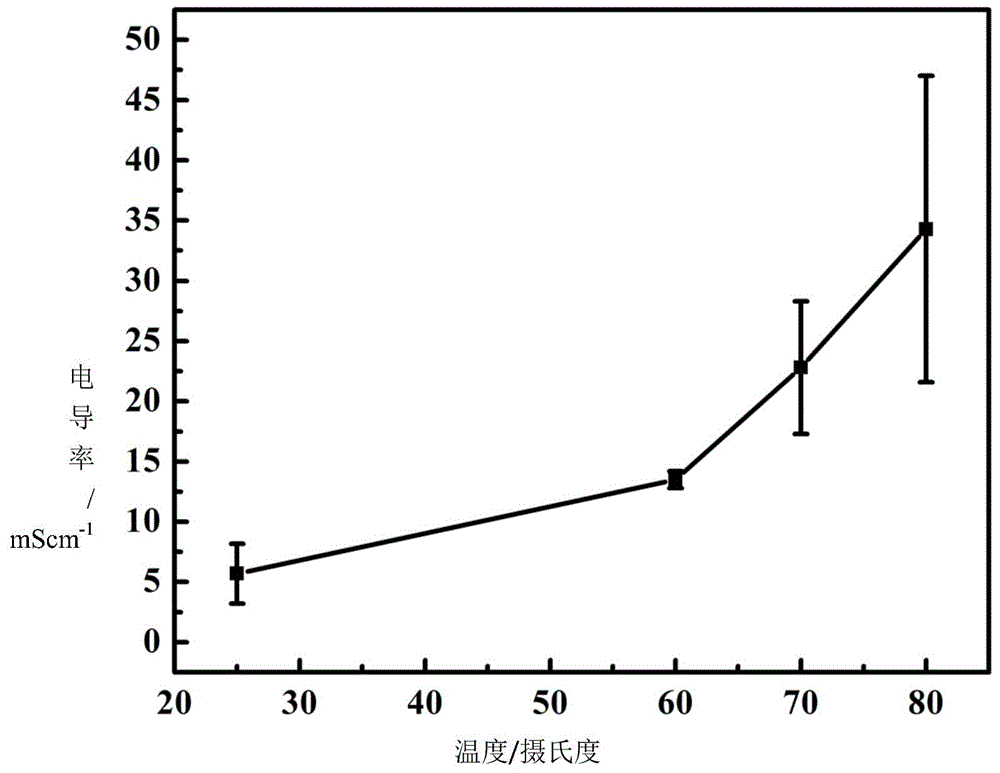N1 position-substituted imidazole compound and alkaline anion exchange membrane, and preparation methods thereof
A technology of imidazole compounds and basic anions, applied in organic chemistry, climate sustainability, final product manufacturing, etc., to achieve good thermodynamic stability, environmental friendliness, and easy OH-conduction
- Summary
- Abstract
- Description
- Claims
- Application Information
AI Technical Summary
Problems solved by technology
Method used
Image
Examples
Embodiment 1
[0055] in 50mLCCl 4 Add 2g of polyether ketone polymer to it, and dissolve it with magnetic stirring in a condensing cycle at 40°C. Under the condition of an ice-water bath, add 0.5 g of trifluoroacetic acid, stir for 10 min, then slowly drop in 10 mL of chloromethyl ether, and stir for 4 h at 15-17°C. The reactants were poured into absolute ethanol to precipitate solids to obtain chloromethylated polyether ketone polymers, which were thoroughly washed with ethanol and deionized water for several times, and vacuum-dried at 40°C for use. Add 0.5 g of chloromethylated polyether ketone polymer to 10 mL of dimethylacetamide, stir magnetically at 70°C to dissolve it, then add 0.096g of 1,2-dimethylimidazole, stir at 70°C for 24 hours. After the reaction solution returned to room temperature, it was filtered, and the film was cast in a blast drying oven at 50°C by volatile solvent. After the prepared membrane was fully washed with deionized water, it was stored in sealed deionized...
Embodiment 2
[0068] in 80mLCCl 4 Add 2g of polyether ketone polymer to 60°C condensation cycle magnetic stirring to dissolve it. Under the condition of ice-water bath, add 10g of tin tetrachloride, then slowly drop into 10mL of 1,4-dichloromethoxybutane, and react at 15°C for 7h. The reactants were poured into deionized water to precipitate solids to obtain chloromethylated polyether ketone polymers, which were then fully washed with deionized water and vacuum-dried at 45°C for use. Add 4 g (about 40 mmol) of 2-isopropylimidazole into 10 mL of acetonitrile, and stir it magnetically to dissolve it. Under the condition of an ice-water bath, 4 g of 60% NaH / kerosene solid (100 mmol) was added, and after stirring for 10 min, 17.2 mL (about 72 mmol) of n-bromodecane was added, and stirred overnight at room temperature. The reaction solution was poured into water, then extracted and separated with ethyl acetate to obtain the organic matter in the upper layer, and the organic matter was washed w...
Embodiment 3
[0073] in 50mLCCl 4 Add 2g of polystyrene to it, and dissolve it with magnetic stirring in a condensing cycle at 40°C. Under the condition of an ice-water bath (17°C), 2.23g of tin tetrachloride was added, and then 10mL of 1,4-dichloromethoxybutane was slowly added dropwise, and the reaction was carried out at room temperature for 4h. The reactant was poured into deionized water to precipitate a solid to obtain chloromethylated polystyrene, which was then thoroughly washed with deionized water and vacuum-dried at 45°C for use. Add 4 g (about 29 mmol) of 2-butylimidazole into 10 mL of dimethylformamide, and stir it magnetically to dissolve it. Under the condition of an ice-water bath, 6.7 g of potassium tert-butoxide (60 mmol) was added, and after stirring for 10 min, 10.0 mL (about 72 mmol) of n-bromohexane was added, and stirred overnight at room temperature. The reaction solution was poured into water, then extracted and separated with ethyl acetate to obtain the organic m...
PUM
| Property | Measurement | Unit |
|---|---|---|
| concentration | aaaaa | aaaaa |
| temperature | aaaaa | aaaaa |
| tensile strength | aaaaa | aaaaa |
Abstract
Description
Claims
Application Information
 Login to View More
Login to View More - R&D
- Intellectual Property
- Life Sciences
- Materials
- Tech Scout
- Unparalleled Data Quality
- Higher Quality Content
- 60% Fewer Hallucinations
Browse by: Latest US Patents, China's latest patents, Technical Efficacy Thesaurus, Application Domain, Technology Topic, Popular Technical Reports.
© 2025 PatSnap. All rights reserved.Legal|Privacy policy|Modern Slavery Act Transparency Statement|Sitemap|About US| Contact US: help@patsnap.com



